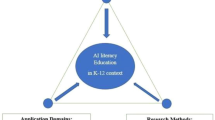Abstract
The kindergarten teachers in the Levittown School District implement an extended day to enhance academic and social development of their students. A description of the literacy and motor skills cluster program and specific examples of a thematic instructional unit are included. Teachers receive professional development and training and are provided with a Literacy and Motor Skills Handbook. They are also given opportunities to attend formal and informal district meetings in order to promote dialogue and enhance student achievement. Research addresses the impact of extended hours on the kindergarten program. Teacher collaboration and student achievement in literacy and motor skill applications are explored, as well as assessment implementation. An overview of the program is delivered in this article, which can be utilized in other school districts.

Similar content being viewed by others
References
Blaydes, J. (2000). How to make learning a moving experience. Virginia Department of Education Video, Richmond, VA.
Brown, J., & Fisher, P. (2006). Balanced literacy: One middle school’s experience. Principal Leadership, 7(1), 38–40.
Chen, W., Cone, T. P., & Cone, S. L. (2007). A collaborative approach to developing an interdisciplinary unit. Journal of Teaching in Physical Education, 26(2), 3–124.
Gable, R. A., Mostert, M. P., & Tonelson, S. W. (2004). Assessing professional collaboration in schools: Knowing what works. Preventing School Failure, 48(3), 4–8.
Gullo, D. F. (1990). The changing family context: Implications for the development of all-day kindergartens. Young Children, 45(4), 35–39.
Hannaford, C. (1995). Smart moves: Why learning is not all in your head. Arlington, VA: Great Ocean Publishers.
Henderson, A. T., & Mapp, K. L. (2002). A new wave of evidence: The impact of school, family, and community connections on student achievement. Austin, TX: National Center for Family and Community with Schools, Southwest Educational Development Laboratory. (ERIC Document No. ED 474 521).
No Child Left Behind Act of 2001, Public Law No. 107–110, Sect. 9101 (32), 115 Stat. 1425 (2002). Retrieved October 9, 2007 from http://www.ed.gov/policy/elsec/leg/esea02/pg107.html#sec9101.
Perez-Katz, A. (2007). Teacher support systems: A collaboration model. Principal Leadership, 7(9), 38–41.
Reynolds, A. J., Mavrogenes, N. A., Hagemann, M., & Bezruczko, N. (1993). Schools families and children: Sixth year results from the longitudinal study of children at risk. Chicago: Chicago Public Schools Department of Research, Evaluation and Planning. (ERIC Document No. 362 307).
Steven-Smith, D. (2004). Movement and learning: A valuable connection. Strategies: A Journal for Physical and Sport Educators, 18(1), 10–11.
Author information
Authors and Affiliations
Corresponding author
Rights and permissions
About this article
Cite this article
Hendler, S., Nakelski, M. Extended Day Kindergarten: Supporting Literacy and Motor Development through a Teacher Collaborative Model. Early Childhood Educ J 36, 57–62 (2008). https://doi.org/10.1007/s10643-008-0241-8
Received:
Accepted:
Published:
Issue Date:
DOI: https://doi.org/10.1007/s10643-008-0241-8




